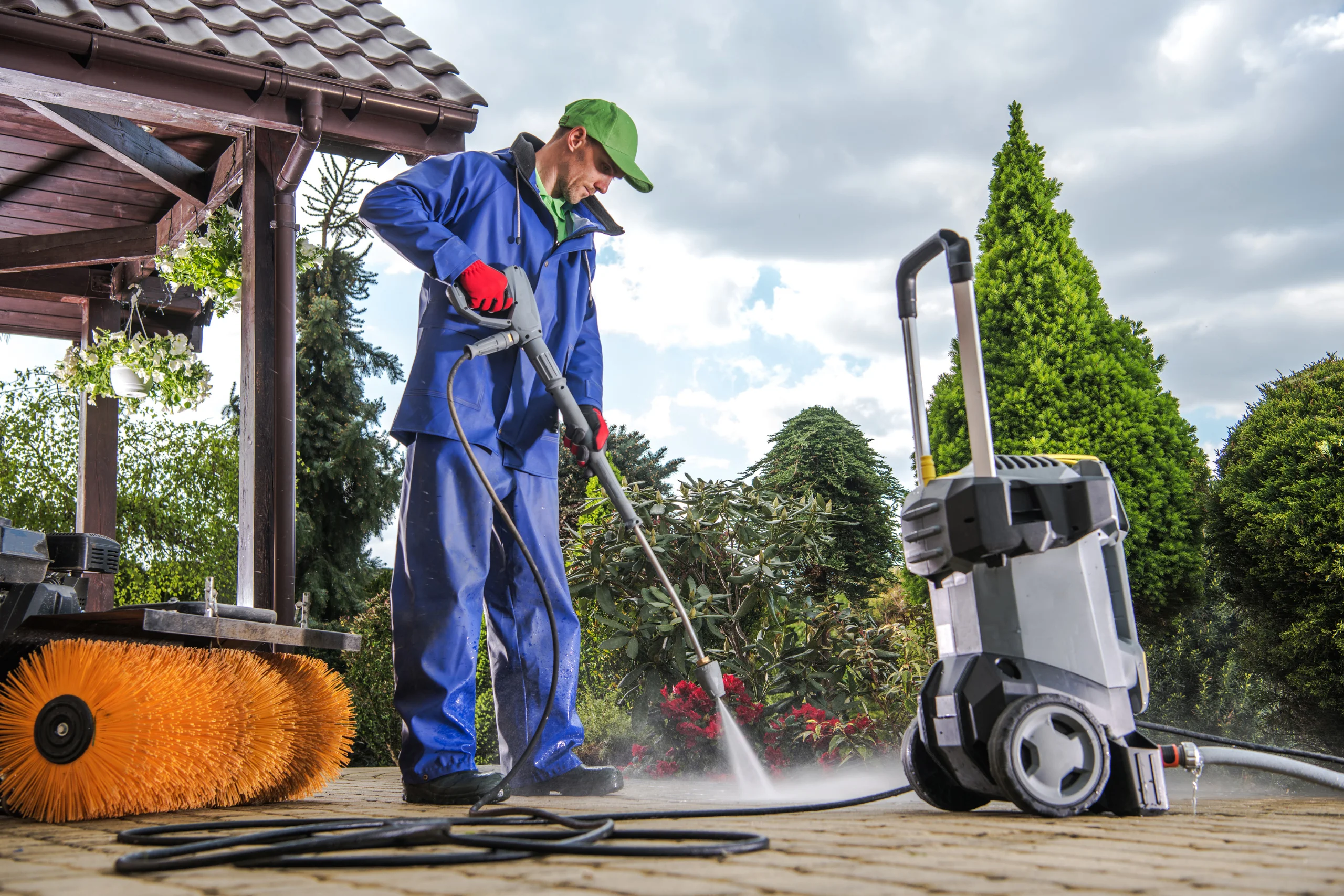Are you considering starting your own pressure washing business? With the increasing demand for exterior cleaning services, now is an excellent time to enter this lucrative industry.
Pressure washing is not just about cleaning; it’s a lucrative business opportunity with significant potential in today’s market. According to Gitnux Market Data Report 2024, the global pressure washing market size is projected to reach USD 3.0 billion by 2026, with a CAGR of 4.2%. The Pressure Washing Industry is expected to grow 4% and produce 156,200 job opportunities between 2018 and 2028.
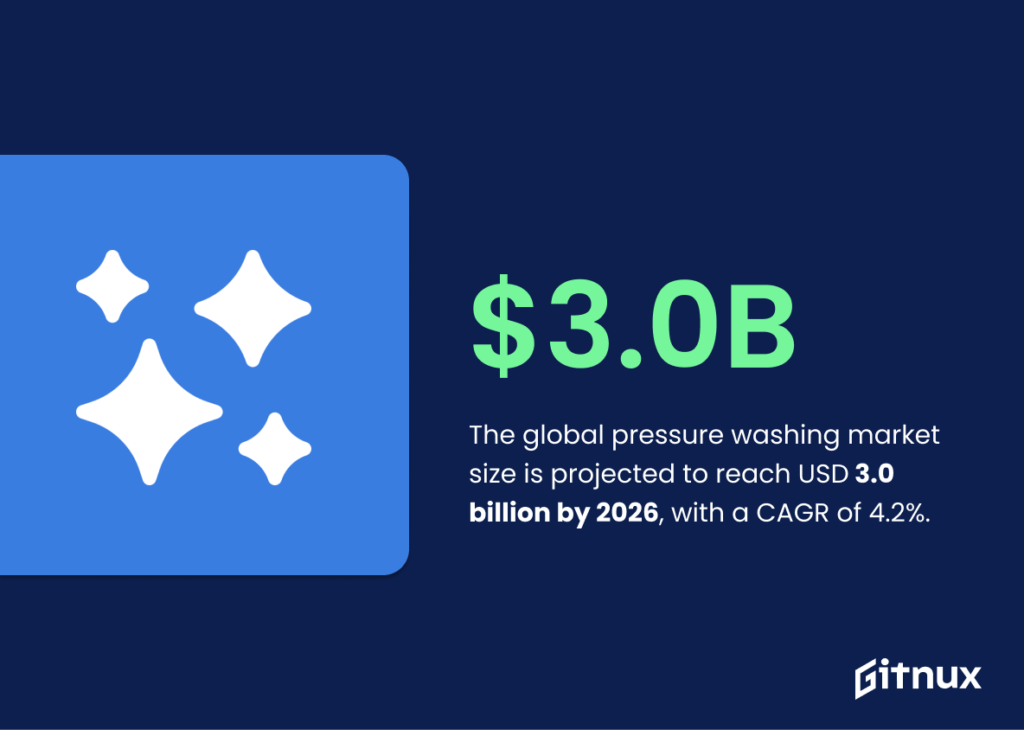
However, launching a successful pressure washing business requires careful planning, preparation, and execution. This comprehensive guide will teach you everything you need to know to start and grow a profitable pressure washing business.
From obtaining the necessary permits and licenses to choosing the right equipment, pricing your services, and implementing effective marketing strategies, we’ll cover all the essential steps to help you launch your business confidently. Whether you’re a seasoned entrepreneur or a first-time business owner, this guide will provide the knowledge and resources you need to succeed in the pressure-washing business.
Table of Contents
What is a Pressure Washing Business?
At its core, pressure washing uses high-pressure water spray to remove dirt, grime, mold, and other substances from surfaces. This section explores the various services you can offer, such as residential cleaning, commercial projects, and specialized services like graffiti removal.
A pressure washing business can offer various services to cater to different needs and clientele. Some of the common services include:
- Exterior House Washing: Cleaning the exterior surfaces of residential properties, including siding, roofs, driveways, and sidewalks, to remove dirt, mold, mildew, and other stains.
- Commercial Building Cleaning: Providing exterior cleaning services for commercial properties such as office buildings, retail stores, restaurants, and warehouses to maintain a clean and professional appearance.
- Deck and Patio Cleaning: Cleaning and revitalizing wooden decks, patios, porches, and outdoor living spaces to remove dirt, mold, mildew, algae, and weathering, restoring their appearance and prolonging their lifespan.
- Concrete and Asphalt Cleaning: Cleaning and restoring concrete surfaces such as parking lots, sidewalks, and driveways, as well as asphalt surfaces, to remove oil stains, tire marks, and other contaminants.
- Fence and Gate Cleaning: Pressure washing fences, gates, and other outdoor structures to remove dirt, algae, and mildew, enhancing their appearance and longevity.
- Graffiti Removal: Offering graffiti removal services to property owners and municipalities to eliminate unwanted graffiti from walls, fences, and other surfaces.
- Gutter Cleaning: Removing debris, leaves, and other obstructions from gutters and downspouts to prevent water damage and maintain proper drainage.
- Vehicle Fleet Washing: Providing washing services for commercial vehicle fleets, including trucks, vans, and buses, to maintain a clean and professional image for businesses.
- Industrial Equipment Cleaning: Cleaning and degreasing industrial equipment, machinery, and facilities to remove built-up dirt, grease, and contaminants, ensuring safe and efficient operation.
- Driveway and Sidewalk Cleaning: Pressure washing driveways, sidewalks, walkways, and pathways to remove dirt, oil stains, grease, algae, and other debris, enhancing curb appeal and safety.
- Specialty Cleaning Services: Offering specialized cleaning services such as roof cleaning, awning cleaning, graffiti protection, and mold remediation to address specific client needs.
By offering a comprehensive range of pressure washing services, a pressure washing business can address the diverse needs of its clients and establish itself as a trusted provider of exterior cleaning solutions. It’s essential to tailor services to meet the specific requirements of residential, commercial, and industrial properties while adhering to industry best practices and safety standards.
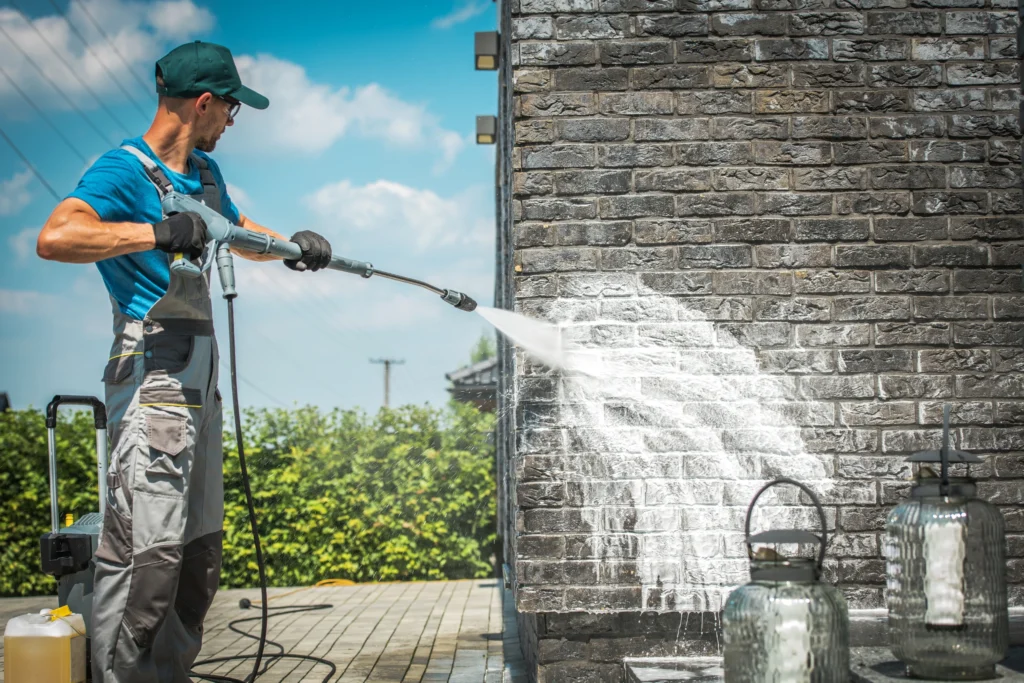
Target Market and Clientele
Before diving into the pressure washing business, it’s crucial to understand your potential clients and competitors. This section covers how to conduct thorough market research and set realistic business goals.
The potential clientele for a pressure washing business can include:
- Residential Clients. Homeowners typically hire pressure washing companies for 23cleaning services for their houses, driveways, decks, and other outdoor surfaces. Pressure washing can effectively remove dirt, grime, mold, mildew, and other stains from exterior surfaces such as siding, driveways, and decks, restoring them to their original condition and enhancing the curb appeal of their homes.
- Commercial Clients: Businesses, property managers, and facility owners who need exterior cleaning services for their commercial properties, including office buildings, retail stores, and restaurants.
- Industrial Clients: Manufacturing facilities, warehouses, and industrial sites that require cleaning services for their equipment, machinery, and facilities.
- Municipalities: Local governments and municipalities that need graffiti removal, street cleaning, and maintenance services for public spaces and infrastructure.
- Property Management Companies: Companies that manage rental properties, apartment complexes, and condominiums may require regular cleaning services to maintain the appearance and value of their properties.
- Construction Companies: Construction firms and contractors may need pressure washing services for new construction projects and cleaning services for construction equipment and machinery.
- Fleet Owners: Companies with vehicle fleets, such as delivery services, transportation companies, and logistics firms, may require regular washing services to keep their vehicles clean and well-maintained.
- Retail Businesses: Retailers with storefronts, shopping centers, and commercial complexes may need exterior cleaning services to attract customers and maintain a clean and inviting environment.
- Hospitality Industry: Hotels, resorts, and hospitality businesses may require pressure washing services for their outdoor areas, including sidewalks, pool decks, and exterior walls, to enhance guest experience and satisfaction.
- Educational Institutions: Schools, colleges, and universities may need cleaning services for their campuses, including sidewalks, parking lots, and outdoor recreational areas, to provide a safe and clean environment for students, faculty, and staff.
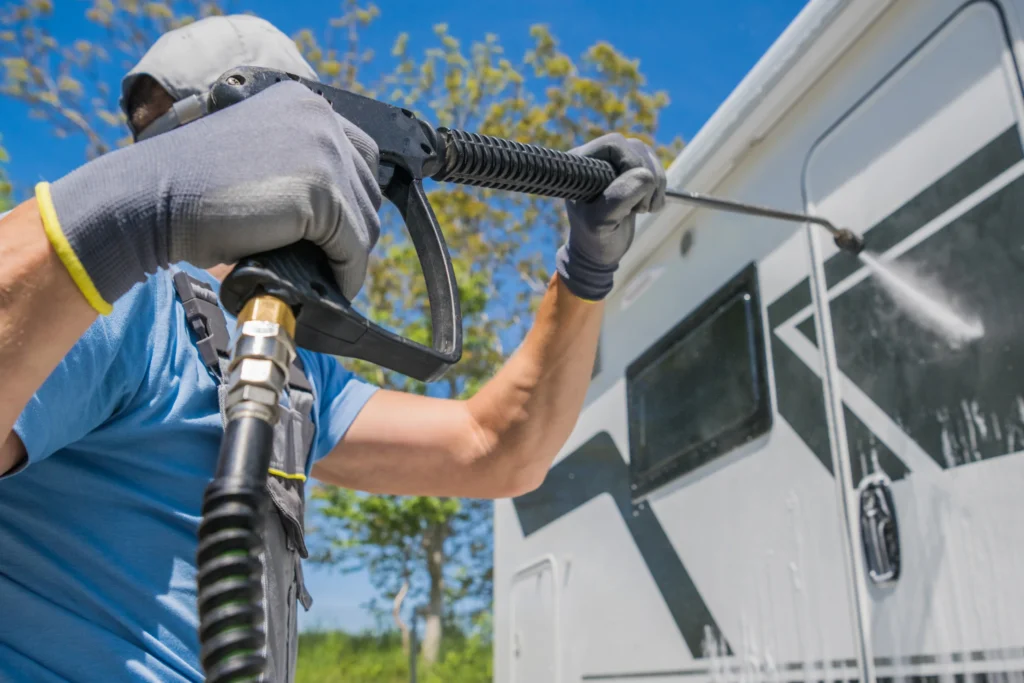
Legal Requirements
Starting a pressure washing business requires compliance with various legal requirements to ensure the legality and smooth operation of the business. Here are some key legal considerations:
Business Registration
Starting a pressure washing business typically involves fulfilling various business registration requirements to establish the venture legally.
Firstly, you’ll need to decide on your business’s legal structure, whether a sole proprietorship, partnership, limited liability company (LLC) or corporation. Once determined, you’ll need to register your business with the appropriate state or local authorities, which often involves filing the necessary paperwork and paying registration fees.
Additionally, if you plan to use a business name different from your legal name, you might need to register a “Doing Business As” (DBA) name. Also known as a fictitious business name or trade name, this process allows businesses to operate under a name other than the owner’s personal name or the registered name of a corporation or LLC.
In many jurisdictions, including California, businesses must register their DBA name with the appropriate county or state agency, often the county clerk’s office or the Secretary of State’s office, depending on the state’s regulations. Registering a DBA helps ensure transparency and compliance with legal requirements, as it provides public notice of the business’s use of a particular name for conducting commercial activities. Additionally, it allows consumers to identify the individuals or entities behind a business and facilitates legal and financial transactions conducted under the DBA name.
Depending on your location, you may also need to obtain permits or licenses specifically for operating a pressure washing business. For example, in California, you will need several permits to start a pressure-washing business, depending on factors such as the location of your business, the type of pressure washing equipment you use, and any environmental considerations. Here are some common permits and licenses you may need to start a pressure washing business in California:
- Business License: Most cities and counties in California require businesses to obtain a business license or permit to operate legally within their jurisdiction. You’ll need to check with your local city or county government to determine the requirements and fees for obtaining a business license.
- Contractor’s License: If you plan to offer pressure washing services as a contractor, you may need to obtain a contractor’s license from the California Contractors State License Board (CSLB). Depending on the scope of your services, different classifications of contractor’s licenses may be required.
- Environmental Permits: Pressure washing involves using water and cleaning chemicals, which may necessitate obtaining permits related to environmental protection. This could include permits for wastewater discharge or handling hazardous materials. You may need to contact the California Environmental Protection Agency (CalEPA) or local environmental agencies for guidance on obtaining the necessary permits.
- Water Use Permits: Depending on your location and water usage, you may need to obtain water use and conservation permits. California has stringent water regulations, so it’s essential to ensure compliance with any permits or restrictions related to water use for pressure washing activities.
- Stormwater Discharge Permits: If your pressure washing activities could potentially discharge wastewater into storm drains or waterways, you may need a stormwater discharge permit. This permit helps regulate pollutants and contaminants in stormwater runoff to protect water quality.
- Hazardous Waste Generator Permit: If your pressure washing activities generate hazardous waste, such as used cleaning chemicals or contaminated water, you may need a hazardous waste generator permit from the California Department of Toxic Substances Control (DTSC).
- Vehicle Permits: If you use vehicles for your pressure washing business, ensure they are registered and insured for commercial use. Commercial vehicle registration and permits may be required depending on the weight and type of vehicles you use.
Each state may have different permit and licensing requirements. To avoid potential fines or penalties, it’s essential to research and comply with all relevant permits and licenses required for starting a pressure washing business. Consider consulting with local authorities or regulatory agencies for guidance specific to your area and business activities.
Insurance
A pressure washing business should consider obtaining several types of insurance to protect itself from potential liabilities and risks. First and foremost, liability insurance is crucial, as it provides coverage for property damage or bodily injury that may occur during pressure washing operations. This type of insurance can help cover legal expenses and damages if a client’s property is damaged or someone is injured on the job.
Additionally, workers’ compensation insurance is essential if the business has employees, as it provides coverage for medical expenses and lost wages for employees who are injured while working.
Other types of insurance include commercial auto insurance to cover vehicles used for business purposes, property insurance to protect equipment and business property, and pollution liability insurance to cover any environmental damage caused by cleaning chemicals or wastewater.
By securing the appropriate insurance coverage, a pressure washing business can operate with peace of mind, knowing that it is protected against potential risks and liabilities. Consulting with an insurance agent specializing in commercial coverage can help ensure the business obtains the necessary policies tailored to its specific needs and risks.
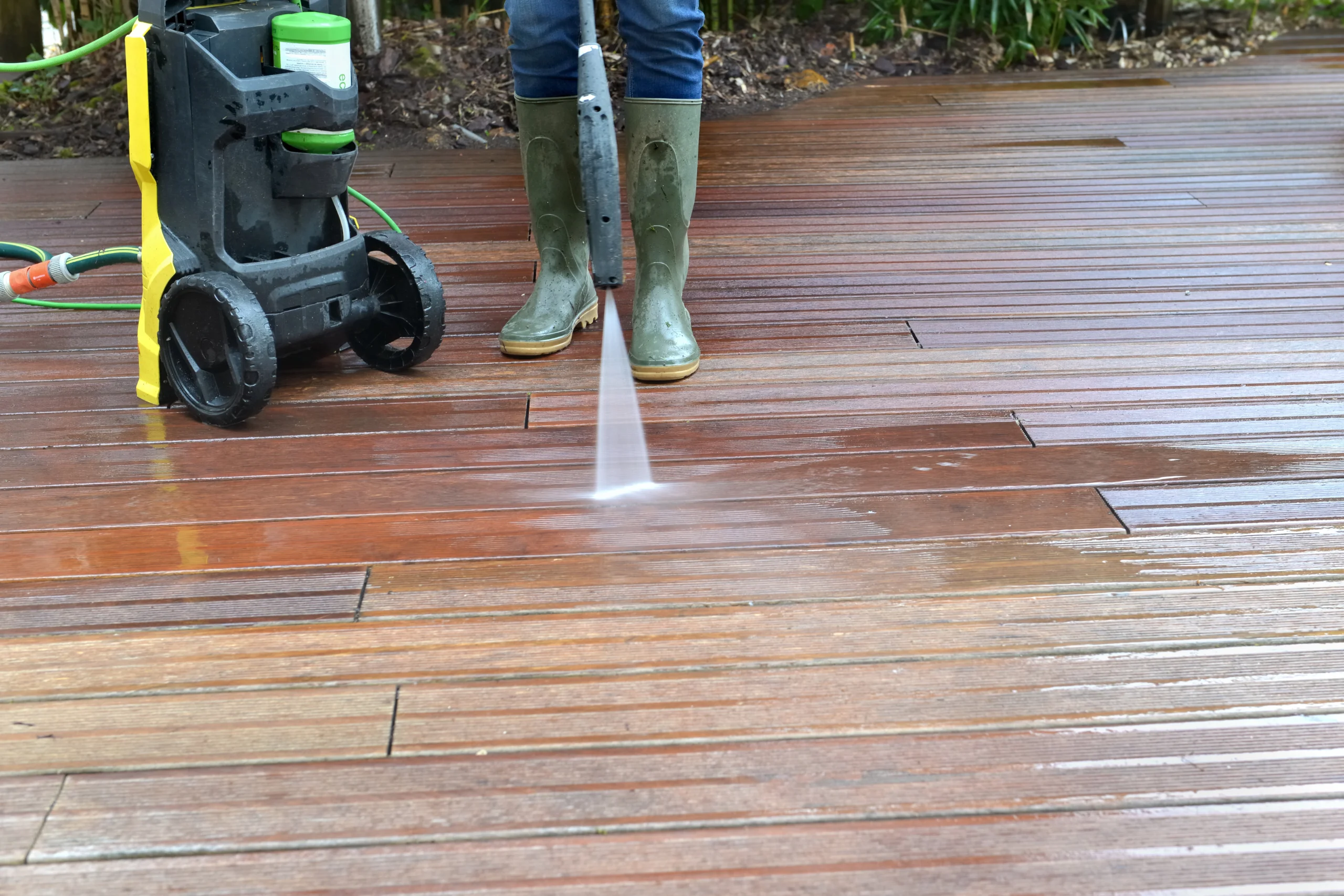
Tax Obligations
Like any other business entity, a pressure washing business has various tax obligations that must be fulfilled to comply with federal, state, and local tax laws. Here are some of the key tax obligations for a pressure washing business:
- Employer Identification Number (EIN): If the pressure washing business has employees or operates as a corporation or partnership, it must obtain an Employer Identification Number (EIN) from the Internal Revenue Service (IRS). The EIN is used for tax filing purposes and is necessary for reporting employment taxes, withholding taxes, and other federal tax obligations.
- Income Taxes: The pressure washing business is responsible for paying federal income taxes on its net income. This typically involves filing an annual income tax return (Form 1120 for corporations, Form 1065 for partnerships, or Schedule C of Form 1040 for sole proprietorships) and paying any taxes owed to the IRS.
- Self-Employment Taxes: If the pressure washing business is operated as a sole proprietorship or single-member LLC, the owner is generally subject to self-employment taxes, which include Social Security and Medicare taxes. These taxes are paid on the owner’s net earnings from self-employment and are reported on Schedule SE of Form 1040.
- Payroll Taxes: If the pressure washing business has employees, it must withhold federal income taxes, Social Security taxes, and Medicare taxes from employees’ wages. The business is also responsible for paying the employer’s share of Social Security and Medicare taxes and federal unemployment taxes (FUTA). These taxes must be reported and deposited to the IRS regularly, typically through the Electronic Federal Tax Payment System (EFTPS) or by using IRS Form 941.
- State and Local Taxes: In addition to federal taxes, the pressure washing business may be subject to various state and local taxes, such as state income taxes, sales taxes, and business privilege taxes. Researching and complying with the tax requirements imposed by the state and local governments where the business operates is important.
- Estimated Taxes: Depending on the business’s income and tax liabilities, it may be required to make quarterly estimated tax payments to the IRS and state tax authorities. Estimated tax payments are used to pay income and self-employment taxes on income that are not subject to withholding, such as business profits.
- Other Tax Obligations: Depending on the specific circumstances of the pressure washing business, there may be other tax obligations to consider, such as excise taxes on certain products or services, property taxes on business assets, and taxes related to the purchase or sale of business assets.
To ensure compliance with all tax obligations, pressure washing business owners should consult a qualified tax professional or accountant who can provide guidance tailored to their business structure and circumstances.
Other Legal Requirements
Here are some of the other legal, operational, and regulatory requirements that you need to follow when starting a pressure washing business:
- Zoning and Land Use Regulations:
- Ensure that your business location complies with zoning laws and regulations.
- Check if there are any restrictions on operating a pressure washing business in residential areas.
- Contracts and Agreements:
- Develop contracts or service agreements outlining the terms and conditions of your services, including pricing, scope of work, and liability provisions.
- Consider consulting with a lawyer to draft or review contracts to protect your interests.
- Safety Regulations:
- Comply with occupational health and safety regulations to ensure a safe working environment for you and your employees.
- Provide necessary safety equipment and training for handling pressure washing equipment and chemicals.
- Intellectual Property Protection:
- Protect your business name, logo, and other intellectual property by registering trademarks or service marks if necessary.
- Compliance with Industry Standards:
- Adhere to industry standards and best practices for pressure washing to maintain quality service and customer satisfaction.
- Business Ethics and Consumer Protection:
- Operate your business ethically and transparently, providing accurate information about your services and pricing.
- Ensure compliance with consumer protection laws and regulations, including fair advertising practices and protection of customer data.
When starting and operating a pressure washing business, it’s essential to consult with legal and regulatory experts in your area to ensure full compliance with all applicable laws and regulations.
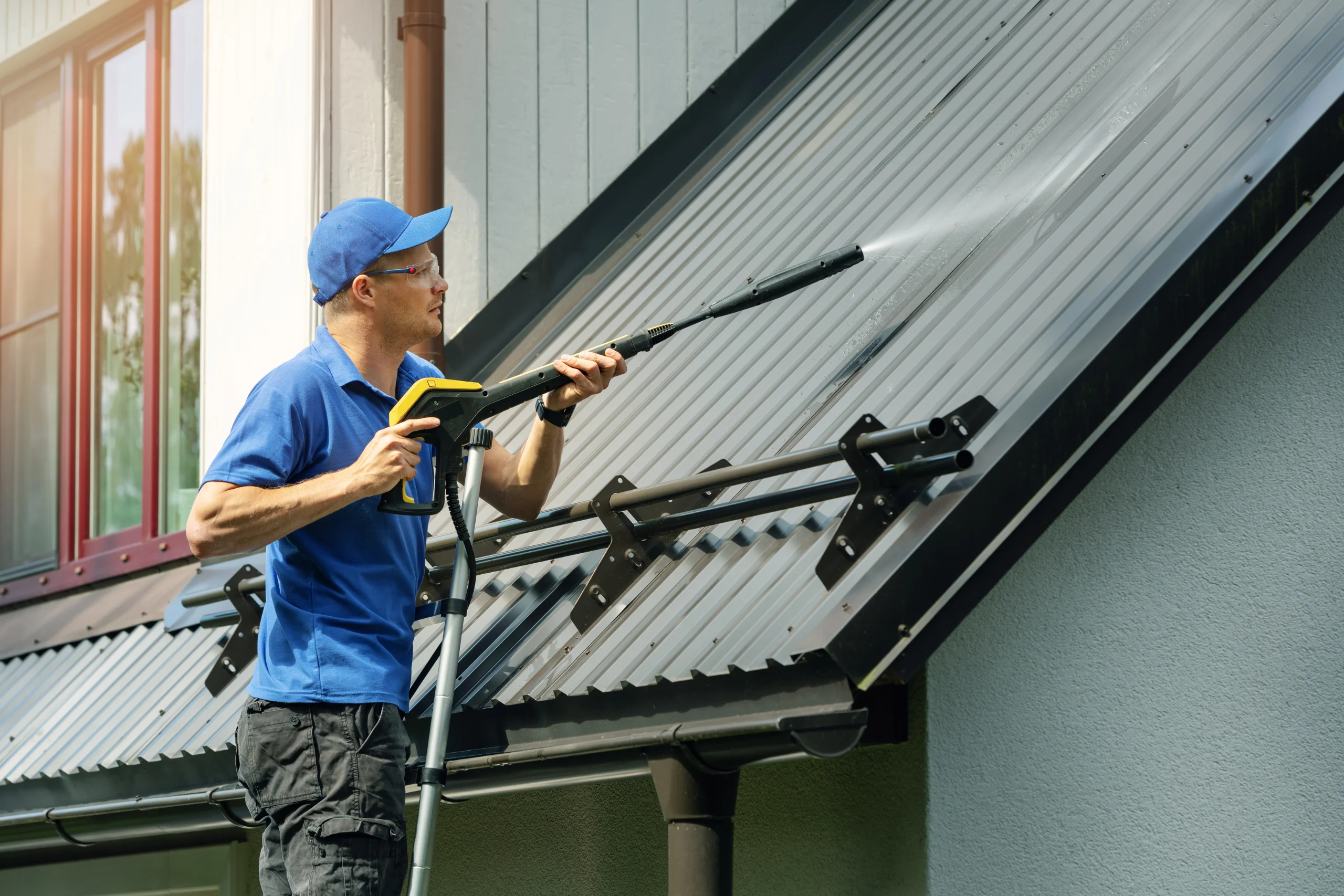
Purchasing Equipment to Start a Pressure Washing Business
The right equipment is the backbone of your pressure-washing business. Good quality equipment typically delivers better performance, providing higher water pressure and more consistent cleaning results. High-quality pressure washers and accessories are more durable and reliable, reducing the risk of breakdowns and downtime during operations. This allows you to tackle a wider range of cleaning tasks effectively, from removing stubborn stains to cleaning delicate surfaces, expanding your service offerings, and attracting more customers. This ensures you can complete jobs efficiently and meet customer deadlines without interruptions.
Moreover, investing in top-notch equipment reflects professionalism and reliability to clients, instilling confidence in your ability to deliver superior results. Good quality equipment enhances your pressure washing business’s efficiency, effectiveness, and reputation, positioning you for success in a competitive market.
We’ll guide you through choosing the best pressure washers and essential tools that balance quality and cost-effectiveness. Here’s a comprehensive list of equipment needed to start a pressure washing business, along with estimated cost prices:
- Pressure Washer: A high-quality pressure washer is the cornerstone of your business. Prices vary depending on size and features, but expect to invest between $500 and $2000 for a professional-grade model.
- Nozzles and Attachments: Purchase a variety of nozzles and attachments for different cleaning tasks. Prices range from $20 to $100, depending on the type and quality.
- Surface Cleaner: A surface cleaner attachment helps clean large flat surfaces quickly and efficiently. Expect to pay around $200 to $500 for a quality surface cleaner.
- Extension Wands: Extension wands are essential for reaching high or hard-to-access areas. Prices start at $50 and can go up to $200 depending on length and material.
- Hoses and Hose Reels: Invest in durable hoses and reels for efficient water delivery and management. Prices range from $50 to $300, depending on length and quality.
- Water Tank or Source: Depending on your setup, you may need a water tank or access to a water supply. Prices vary significantly depending on size and type, ranging from $100 for a small tank to several thousand dollars for larger capacity tanks.
- Cleaning Agents and Detergents: Purchase environmentally-friendly cleaning agents and detergents suitable for pressure washing. Budget around $50 to $100 for a variety of cleaning solutions.
- Personal Protective Equipment (PPE): Ensure the safety of yourself and your employees with PPE, such as safety goggles, gloves, and protective clothing—budget approximately $50 to $100 for essential safety gear.
- Transportation Vehicle: You’ll need a sturdy vehicle, such as a truck or trailer, to transport equipment to job sites. Prices vary widely depending on the type and condition of the vehicle, ranging from $5000 for a used truck to $20,000 or more for a new one.
- Maintenance and Repair Tools: Invest in basic maintenance and repair tools to maintain your equipment—budget around $100 to $200 for essential tools such as wrenches, screwdrivers, and lubricants.
Overall, the total startup cost for equipment needed to start a pressure washing business can range from $1000 to $5000 or more, depending on the quality and quantity of equipment purchased. It’s essential to invest in high-quality equipment to deliver professional results and ensure the success of your business in the long run.
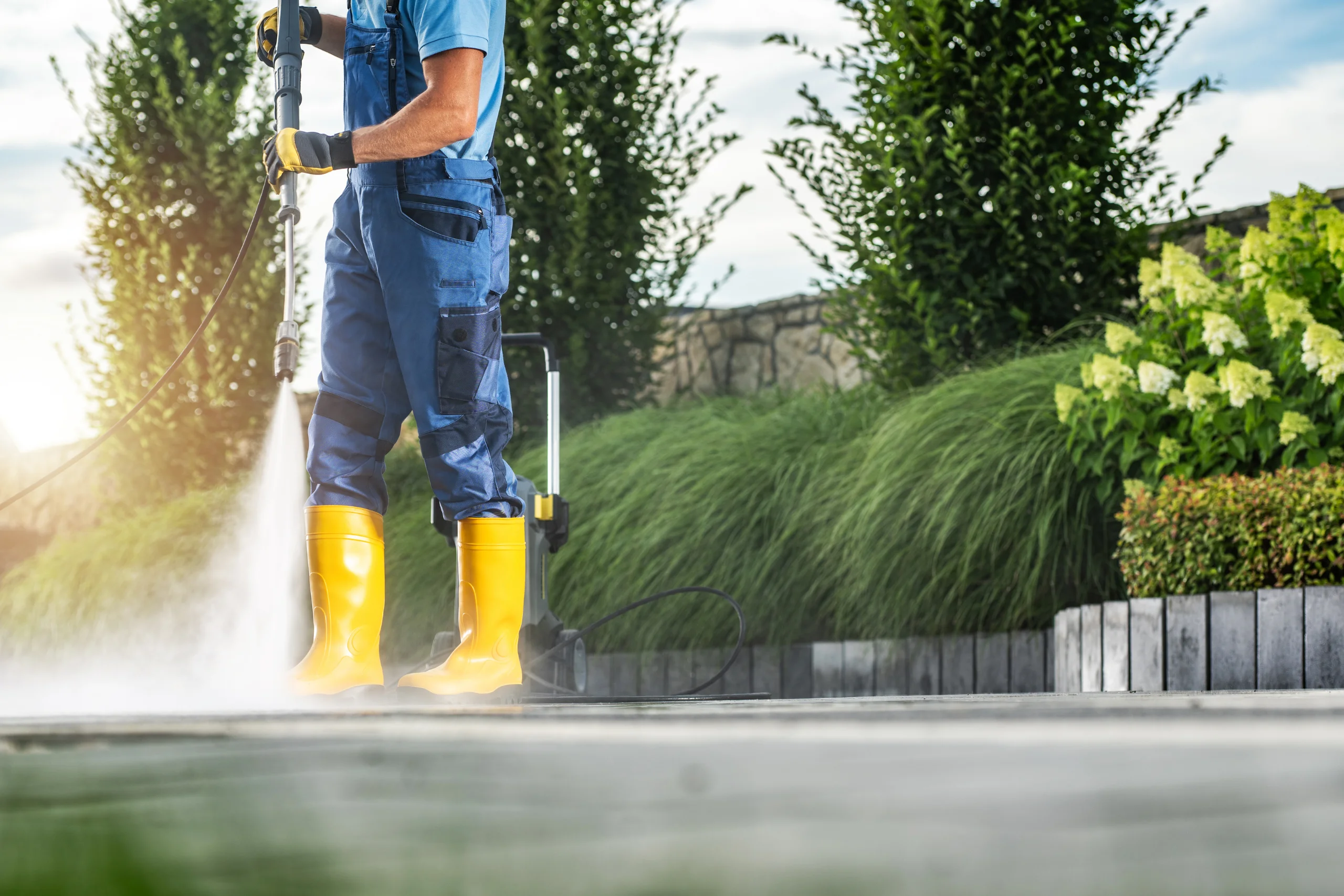
Pricing Strategies
Pricing a pressure washing business involves careful consideration of several factors to ensure competitiveness, profitability, and fairness to both the business and its customers. To set competitive prices, it’s essential to research the market and understand the pricing landscape in your area. Analyze the rates charged by competitors offering similar services and consider factors such as the job size, the work’s complexity, and the level of expertise required. Consider overhead costs, including equipment maintenance, insurance, fuel, labor, and marketing expenses, to determine your desired profit margin.
When setting prices, aim to balance customer affordability and profitability for your business. Consider offering tiered pricing options based on the scope of work or package deals for bundled services to provide flexibility and value to customers while maximizing revenue potential. You may also differentiate your services by highlighting unique selling points such as eco-friendly cleaning solutions, specialized equipment, or superior customer service to justify premium pricing.
Regarding discounts, consider offering promotions for first-time customers, repeat business, or seasonal specials to incentivize bookings and foster customer loyalty. However, be strategic with discounts to ensure they don’t undermine your profitability or devalue your services. Evaluate the impact of discounts on your bottom line and set clear terms and conditions to prevent abuse or misuse. Communicate the value proposition of your services effectively to justify your pricing structure and position your business as a trusted provider of quality pressure washing solutions.
Ultimately, pricing your pressure washing business requires a balance of market research, cost analysis, and strategic pricing strategies to remain competitive while maximizing profitability. Regularly review and adjust your pricing strategy to adapt to changing market conditions, customer preferences, and business goals. By offering competitive prices and delivering exceptional service, you can attract and retain customers while ensuring your pressure washing business’s long-term success and sustainability.
Marketing Your Business
Marketing a pressure washing business effectively requires strategic planning, targeted outreach, and effective communication. Here are some tips to help you market your pressure washing business successfully:
- Define Your Target Audience: Identify your ideal customers based on demographics, location, and specific needs. Tailor your marketing efforts to target these potential clients effectively.
- Develop a Professional Brand Identity: Create a strong brand identity for your pressure washing business, including a memorable logo, consistent branding elements, and professional marketing materials. A professional image will help you stand out and attract customers.
- Build a Responsive Website: Invest in a well-designed website that showcases your services, highlights your expertise, and provides easy access to contact information. Optimize your website for search engines to improve visibility and attract organic traffic.
- Utilize Local SEO: Optimize your online presence for local search by including relevant keywords, creating local business listings on platforms like Google My Business, and encouraging positive reviews from satisfied customers. Local SEO will help potential customers find your business when searching for pressure washing services in your area.
- Leverage Social Media: Use social media platforms such as Facebook, Instagram, and LinkedIn to showcase your work, engage with potential customers, and build relationships within your community. Share before-and-after photos, customer testimonials, and helpful tips to demonstrate your expertise and attract followers.
- Network with Local Businesses: Establish relationships with complementary businesses in your area, such as real estate agencies, property management companies, and home improvement contractors. Networking can lead to referrals and partnerships that help you reach new customers.
- Offer Promotions and Discounts: Offer promotions, discounts, or package deals to attract new customers and encourage repeat business. Consider seasonal promotions or special offers for first-time customers to incentivize bookings.
- Invest in Local Advertising: Explore advertising options such as local newspapers, magazines, community newsletters, and online directories. Target your ads to reach homeowners, property managers, and businesses in your service area.
- Provide Excellent Customer Service: Focus on delivering exceptional service and exceeding customer expectations. Satisfied customers are more likely to recommend your business to others and leave positive reviews, which can help attract new clients.
- Monitor and Track Results: Regularly evaluate the performance of your marketing efforts and track key metrics such as website traffic, leads generated, and conversion rates. Use this data to refine your marketing strategies and allocate resources more effectively.
By implementing these tips and strategies, you can effectively market your pressure washing business and attract a steady stream of customers. Remember to stay consistent, adapt to changing market conditions, and prioritize delivering high-quality service to your clients.
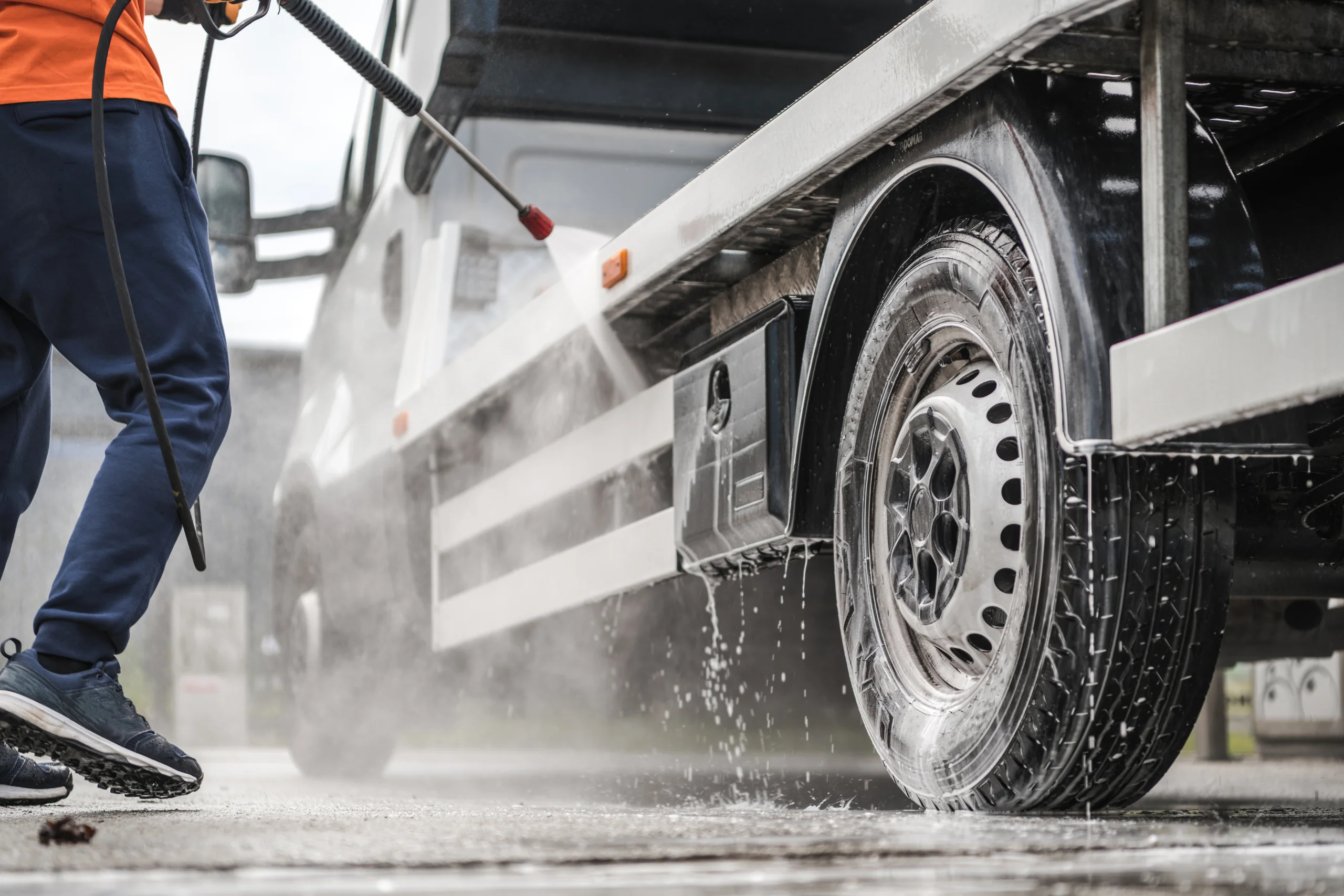
Conclusion
In conclusion, starting a pressure washing business can be rewarding for entrepreneurs looking to capitalize on the demand for exterior cleaning services. Following the steps outlined in this article, aspiring business owners can lay the groundwork for a successful and profitable operation. From conducting thorough market research and obtaining the necessary permits and licenses to investing in quality equipment and implementing effective marketing strategies, careful planning and execution are key to launching a thriving pressure washing business.
Additionally, prioritizing customer satisfaction, professionalism, and safety throughout every business journey will help build a solid reputation and foster long-term success. With dedication, hard work, and a commitment to delivering high-quality service, entrepreneurs can turn their passion for pressure washing into a lucrative and fulfilling business opportunity.
FAQs on Starting a Pressure Washing Business
- What is the initial investment required to start a pressure washing business?
- The initial investment includes the cost of equipment, licenses, insurance, and marketing efforts. This varies based on the scale and location of the business.
- Do I need special training or certification for pressure washing?
- While not always mandatory, training and certification can enhance your skills and credibility in the industry.
- How can I differentiate my pressure washing business from competitors?
- Focus on unique selling points like eco-friendly practices, specialized services, or exceptional customer service.
- Is it important to have an online presence for my pressure washing business?
- Yes, an online presence helps in reaching a wider audience and provides credibility.
- Can I operate a pressure washing business part-time?
- Absolutely, many entrepreneurs start on a part-time basis and scale up as the business grows.

